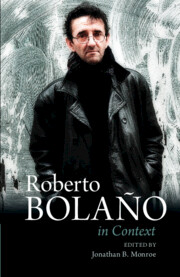Book contents
- Roberto Bolaño in Context
- Roberto Bolaño in Context
- Copyright page
- Contents
- Contributors
- Chronology
- Part I Geographical, Social, and Historical Contexts
- Part II Shaping Events and Literary History
- Chapter 9 France, Spain, 1938
- Chapter 10 The Cold War
- Chapter 11 After the Fall of the Wall: 1989–2001
- Chapter 12 Latin American Literature
- Chapter 13 French Connections
- Chapter 14 German and Russian Precursors
- Chapter 15 After the Two 9/11s: Santiago, 1973, New York, 2001
- Part III Genres, Discourses, Media
- Part IV Aesthetics, Culture, and Politics
- Further Reading
- Index
Chapter 11 - After the Fall of the Wall: 1989–2001
from Part II - Shaping Events and Literary History
Published online by Cambridge University Press: 15 December 2022
- Roberto Bolaño in Context
- Roberto Bolaño in Context
- Copyright page
- Contents
- Contributors
- Chronology
- Part I Geographical, Social, and Historical Contexts
- Part II Shaping Events and Literary History
- Chapter 9 France, Spain, 1938
- Chapter 10 The Cold War
- Chapter 11 After the Fall of the Wall: 1989–2001
- Chapter 12 Latin American Literature
- Chapter 13 French Connections
- Chapter 14 German and Russian Precursors
- Chapter 15 After the Two 9/11s: Santiago, 1973, New York, 2001
- Part III Genres, Discourses, Media
- Part IV Aesthetics, Culture, and Politics
- Further Reading
- Index
Summary
Bolaño’s work in the nineties shows him conscious of the harm that has been done to an entire generation and to the psyche of Chile. His preoccupation with the Chilean situation connects with his interest in writing fiction that recounts that loss, along with the establishment of the central pieces of the new economic world order. For him, the fall of the Berlin Wall (1989) unleashes energies associated with a new world map in which the American continent is key to the necropolitics of the end of the century. Bolaño will become the main Latin American author of this period marked by multilateralism, though he is certainly not alone (a central characteristic of Latin American literature of the end of the century is a desire to become global.) Much of what he wrote in the second half of the nineties is an inquiry into Chile’s Pinochet which shows the pervasiveness of evil and the bitter conclusion the neoliberal trend has consolidated. Bolaño’s fame explodes with the publication of The Savage Detectives, which can be read as an instruction manual for contending with the market without making concessions.
- Type
- Chapter
- Information
- Roberto Bolaño In Context , pp. 126 - 133Publisher: Cambridge University PressPrint publication year: 2023

